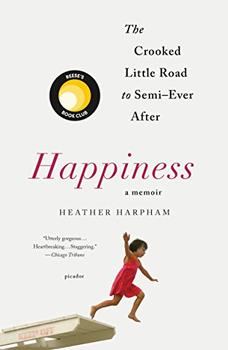Book Club Discussion Questions
In a book club? Subscribe to our Book Club Newsletter!
For supplemental discussion material see our Beyond the Book article, Becoming a Bone Marrow Donor and our BookBrowse Review of Happiness.
Please be aware that this discussion guide will contain spoilers!
- Do you think Happiness is an apt title for this memoir? Why do you think Heather chose this particular, single word as the title?
-
How do you face adversity? Do you hunker down, as Brian described his tactic, or do you reach out for people to huddle with, like Heather did? Or do you take another approach?
-
"I was suddenly afraid of being bitten by a creature whose solitary home I'd invaded" (20). Think about Heather's early relationship with Brian and what this line means in that context. Do you think her use of the metaphor is intentional?
-
What did you think about the way Brian and Heather's relationship evolved over the course of the book, and in particular during the medical ordeals they faced? Do your own relationships thrive during challenging times? Do obstacles you've had to confront with other people bring you closer to them, or test the relationship?
-
On page 68, Heather describes the Nepalese attitude toward appreciation, how people in Nepal don't typically express gratefulness because acts of kindness and community are expected in their culture. Discuss gratitude. At what points does it emerge in Heather's story?
- At the start of chapter ten, Heather pictures Gracie as a balloon floating into the sky with Heather and Brian holding on tightly to its string. What does this striking metaphor for parenthood mean to you?
- Though Heather and Brian decide not to risk having a second child (only to have their intentions thwarted), Heather poses the question of whether it is "ethical to have a second child to save the first child" (101). What do you think? If you were forced to make a similar choice, what would you do?
- Could you see both sides of Heather and Brian's argument about whether to subject Gracie to the bone marrow transplant? Talk about risk. Is it easier to assume such risks for yourself or on behalf of someone you love? In which scenario would you be more comfortable taking a life-threatening risk? Are you a risk-taker by nature?
- A fellow parent in the transplant clinic said to Heather, "This will seem crazy, but don't make friends. You don't know which kids will make it and which won't" (179). Talk about Heather's response to this statement and what it meant to her later as she got closer to some of the families in the clinic. Do you understand both of these perspectives?
- Reflect on the support Heather and Brian's Brooklyn neighbors provided, particularly the fundraiser they organized which yielded enough money to cover Gracie's expenses in North Carolina. Do you believe in the kindness of strangers? Is there a time when you felt the power of an act of kindness, large or small, from a stranger in your life?
- In the book's last page, Heather writes: "We find happiness, if we find it at all, on accident," disputing the idea of a "blueprint" or roadmap to happiness. What do you believe? Is happiness a function of design or grace? Architecture or serendipity? What in your own life brings you most happiness, or even joy, and is that something you've created consciously or simply found?
- We watch Heather's spirituality fluctuate with the many twists of Gracie's medical journey. Many people who go through traumatic experiences turn toward faith to help them cope and find understanding, whether it's embracing religion or spirituality for the first time or reaffirming their existing faith in some way. Has
there been a time in your own life where you rediscovered, or reinforced, your spiritual understandings? Have you ever turned away from your faith in times of crisis?
- In Chapter 50, Heather writes, "Parents of perilously sick kids never stop being afraid," (291). Have you gone through something in your life that you are not able to shake even though the event itself is long in the past? How do you cope with lingering fear or uncertainty?
Unless otherwise stated, this discussion guide is reprinted with the permission of Picador.
Any page references refer to a USA edition of the book, usually the trade paperback version, and may vary in other editions.
